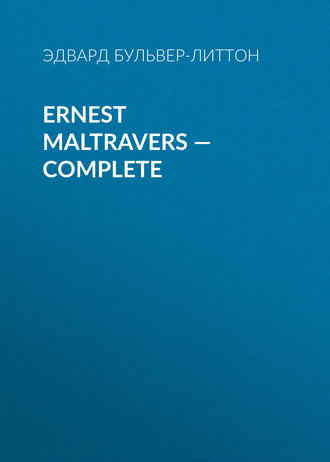
Эдвард Бульвер-Литтон
Ernest Maltravers — Complete
CHAPTER IV
“In mea vesanas habui dispendia vires,
Et valui poenas fortis in ipse meas.” 17
—OVID.
“Then might my breast be read within,
A thousand volumes would be written there.”
EARL OF STIRLING.
ERNEST MALTRAVERS was at the height of his reputation; the work which he had deemed the crisis that was to make or mar him was the most brilliantly successful of all he had yet committed to the public. Certainly, chance did as much for it as merit, as is usually the case with works that become instantaneously popular. We may hammer away at the casket with strong arm and good purpose, and all in vain; when some morning a careless stroke hits the right nail on the head, and we secure the treasure.
It was at this time, when in the prime of youth—rich, courted, respected, run after—that Ernest Maltravers fell seriously ill. It was no active or visible disease, but a general irritability of the nerves, and a languid sinking of the whole frame. His labours began, perhaps, to tell against him. In earlier life he had been as active as a hunter of the chamois, and the hardy exercise of his frame counteracted the effects of a restless and ardent mind. The change from an athletic to a sedentary habit of life—the wear and tear of the brain—the absorbing passion for knowledge which day and night kept all his faculties in a stretch; made strange havoc in a constitution naturally strong. The poor author! how few persons understand; and forbear with, and pity him! He sells his health and youth to a rugged taskmaster. And, O blind and selfish world, you expect him to be as free of manner, and as pleasant of cheer, and as equal of mood, as if he were passing the most agreeable and healthful existence that pleasure could afford to smooth the wrinkles of the mind, or medicine invent to regulate the nerves of the body. But there was, besides all this, another cause that operated against the successful man!—His heart was too solitary. He lived without the sweet household ties—the connections and amities he formed excited for a moment, but possessed no charm to comfort or to soothe. Cleveland resided so much in the country, and was of so much calmer a temperament, and so much more advanced in age, that, with all the friendship that subsisted between them, there was none of that daily and familiar interchange of confidence which affectionate natures demand as the very food of life. Of his brother (as the reader will conjecture from never having been formally presented to him) Ernest saw but little. Colonel Maltravers, one of the gayest and handsomest men of his time, married a fine lady, lived principally at Paris, except when, for a few weeks in the shooting season, he filled his country house with companions who had nothing in common with Ernest: the brothers corresponded regularly every quarter, and saw each other once a year—this was all their intercourse. Ernest Maltravers stood in the world alone, with that cold but anxious spectre—Reputation.
It was late at night. Before a table covered with the monuments of erudition and thought sat a young man with a pale and worn countenance. The clock in the room told with a fretting distinctness every moment that lessened the journey to the grave. There was an anxious and expectant expression on the face of the student, and from time to time he glanced to the clock, and muttered to himself. Was it a letter from some adored mistress—the soothing flattery from some mighty arbiter of arts and letters—that the young man eagerly awaited? No; the aspirer was forgotten in the valetudinarian. Ernest Maltravers was waiting the visit of his physician, whom at that late hour a sudden thought had induced him to summon from his rest. At length the well-known knock was heard, and in a few moments the physician entered. He was one well versed in the peculiar pathology of book men, and kindly as well as skilful.
“My dear Mr. Maltravers, what is this? How are we?—not seriously ill, I hope—no relapse—pulse low and irregular, I see, but no fever. You are nervous.”
“Doctor,” said the student, “I did not send for you at this time of night from the idle fear or fretful caprice of an invalid. But when I saw you this morning, you dropped some hints which have haunted me ever since. Much that it befits the conscience and the soul to attend to without loss of time depends upon my full knowledge of my real state. If I understand you rightly, I may have but a short time to live—is it so?”
“Indeed!” said the doctor, turning away his face; “you have exaggerated my meaning. I did not say that you were in what we technically call danger.”
“Am I then likely to be a long-lived man?”
The doctor coughed—“That is uncertain, my dear young friend,” said he, after a pause.
“Be plain with me. The plans of life must be based upon such calculations as we can reasonably form of its probable duration. Do not fancy that I am weak enough or coward enough to shrink from any abyss which I have approached unconsciously; I desire—I adjure—nay, I command you to be explicit.”
There was an earnest and solemn dignity in his patient’s voice and manner which deeply touched and impressed the good physician.
“I will answer you frankly,” said he; “you overwork the nerves and the brain; if you do not relax, you will subject yourself to confirmed disease and premature death. For several months—perhaps for years to come—you should wholly cease from literary labour. Is this a hard sentence? You are rich and young—enjoy yourself while you can.”
Maltravers appeared satisfied—changed the conversation—talked easily on other matters for a few minutes: nor was it till he had dismissed his physician that he broke forth with the thoughts that were burning in him.
“Oh!” cried he aloud, as he rose and paced the room with rapid strides; “now, when I see before me the broad and luminous path, am I to be condemned to halt and turn aside? A vast empire rises on my view, greater than that of Caesars and conquerors—an empire durable and universal in the souls of men, that time itself cannot overthrow; and Death marches with me, side by side, and the skeleton hand waves me back to the nothingness of common men.”
He paused at the casement—he threw it open, and leant forth and gasped for air. Heaven was serene and still, as morning came coldly forth amongst the waning stars; and the haunts of men, in their thoroughfare of idleness and of pleasure, were desolate and void. Nothing, save Nature, was awake.
“And if, O stars!” murmured Maltravers, from the depth of his excited heart—“if I have been insensible to your solemn beauty—if the Heaven and the Earth had been to me but as air and clay—if I were one of a dull and dim-eyed herd—I might live on, and drop into the grave from the ripeness of unprofitable years. It is because I yearn for the great objects of an immortal being, that life shrinks and shrivels up like a scroll. Away! I will not listen to these human and material monitors, and consider life as a thing greater than the things that I would live for. My choice is made, glory is more persuasive than the grave.”
He turned impatiently from the casement—his eyes flashed—his chest heaved—he trod the chamber with a monarch’s air. All the calculations of prudence, all the tame and methodical reasonings with which, from time to time, he had sought to sober down the impetuous man into the calm machine, faded away before the burst of awful and commanding passions that swept over his soul. Tell a man, in the full tide of his triumphs, that he bears death within him; and what crisis of thought can be more startling and more terrible!
Maltravers had, as we have seen, cared little for fame, till fame had been brought within his reach: then, with every step he took, new Alps had arisen. Each new conjecture brought to light a new truth that demanded enforcement or defence. Rivalry and competition chafed his blood, and kept his faculties at their full speed. He had the generous race-horse spirit of emulation. Ever in action, ever in progress, cheered on by the sarcasms of foes, even more than by the applause of friends, the desire of glory had become the habit of existence. When we have commenced a career, what stop is there till the grave?—where is the definite barrier of that ambition which, like the eastern bird, seems ever on the wing, and never rests upon the earth? Our names are not settled till our death: the ghosts of what we have done are made our haunting monitors—our scourging avengers—if ever we cease to do, or fall short of the younger past. Repose is oblivion; to pause is to unravel all the web that we have woven—until the tomb closes over us, and men, just when it is too late, strike the fair balance between ourselves and our rivals; and we are measured, not by the least, but by the greatest triumphs we have achieved. Oh, what a crushing sense of impotence comes over us, when we feel that our frame cannot support our mind—when the hand can no longer execute what the soul, actively as ever, conceives and desires!—the quick life tied to the dead form—the ideas fresh as immortality, gushing forth rich and golden, and the broken nerves, and the aching frame, and the weary eyes!—the spirit athirst for liberty and heaven—and the damning, choking consciousness that we are walled up and prisoned in a dungeon that must be our burial-place! Talk not of freedom—there is no such thing as freedom to a man whose body is the gaol, whose infirmities are the racks, of his genius!
Maltravers paused at last, and threw himself on his sofa, wearied and exhausted. Involuntarily, and as a half unconscious means of escaping from his conflicting and profitless emotions, he turned to several letters, which had for hours lain unopened on his table. Every one, the seal of which he broke, seemed to mock his state—every one seemed to attest the felicity of his fortunes. Some bespoke the admiring sympathy of the highest and wisest—one offered him a brilliant opening into public life—another (it was from Cleveland) was fraught with all the proud and rapturous approbation of a prophet whose auguries are at last fulfilled. At that letter Maltravers sighed deeply, and paused before he turned to the others. The last he opened was in an unknown hand, nor was any name affixed to it. Like all writers of some note, Maltravers was in the habit of receiving anonymous letters of praise, censure, warning, and exhortation—especially from young ladies at boarding schools, and old ladies in the country; but there was that in the first sentences of the letter, which he now opened with a careless hand, that riveted his attention. It was a small and beautiful handwriting, yet the letters were more clear and bold than they usually are in feminine caligraphy.
“Ernest Maltravers,” began this singular effusion, “have you weighed yourself? Are you aware of your capacities? Do you feel that for you there may be a more dazzling reputation that that which appears to content you? You who seem to penetrate into the subtlest windings of the human heart, and to have examined nature as through a glass—you, whose thoughts stand forth like armies marshalled in defence of truth, bold and dauntless, and without a stain upon their glittering armour;—are you, at your age, and with your advantages, to bury yourself amidst books and scrolls? Do you forget that action is the grand career for men who think as you do? Will this word-weighing and picture-writing—the cold eulogies of pedants—the listless praises of literary idlers, content all the yearnings of your ambition? You were not made solely for the closet; ‘The Dreams of Pindus, and the Aonian Maids’ cannot endure through the noon of manhood. You are too practical for the mere poet, and too poetical to sink into the dull tenor of a learned life. I have never seen you, yet I know you—I read your spirit in your page; that aspiration for something better and greater than the great and the good, which colours all your passionate revelations of yourself and others—cannot be satisfied merely by ideal images. You cannot be contented, as poets and historians mostly are, by becoming great only from delineating great men, or imagining great events, or describing a great era. Is it not worthier of you to be what you fancy or relate? Awake, Maltravers, awake! Look into your heart, and feel your proper destinies. And who am I that thus address you?—a woman whose soul is filled with you—a woman in whom your eloquence has awakened, amidst frivolous and vain circles, the sense of a new existence—a woman who would make you, yourself, the embodied ideal of your own thoughts and dreams, and who would ask from earth no other lot than that of following you on the road of fame with the eyes of her heart. Mistake me not; I repeat that I have never seen you, nor do I wish it; you might be other than I imagine, and I should lose an idol, and be left without a worship. I am a kind of visionary Rosicrucian: it is a spirit that I adore, and not a being like myself. You imagine, perhaps, that I have some purpose to serve in this—I have no object in administering to your vanity; and if I judge you rightly, this letter is one that might make you vain without a blush. Oh, the admiration that does not spring from holy and profound sources of emotion—how it saddens us or disgusts! I have had my share of vulgar homage, and it only makes me feel doubly alone. I am richer than you are—I have youth—I have what they call beauty. And neither riches, youth, nor beauty ever gave me the silent and deep happiness I experience when I think of you. This is a worship that might, I repeat, well make even you vain. Think of these words, I implore you. Be worthy, not of my thoughts, but of the shape in which they represent you: and every ray of glory that surrounds you will brighten my own way, and inspire me with a kindred emulation. Farewell.—I may write to you again, but you will never discover me; and in life I pray that we may never meet!”
CHAPTER V
“Our list of nobles next let Amri grace.”
Absalom and Achitophel.
“Sine me vacivum tempus ne quod dem mihi Laboris.”18
TER.
“I CAN’T think,” said one of a group of young men, loitering by the steps of a clubhouse in St. James’s Street—“I can’t think what has chanced to Maltravers. Do you observe (as he walks—there—the other side of the way) how much he is altered? He stoops like an old man, and hardly ever lifts his eyes from the ground. He certainly seems sick and sad.”
“Writing books, I suppose.”
“Or privately married.”
“Or growing too rich—rich men are always unhappy beings.”
“Ha, Ferrers, how are you?”
“So-so. What’s the news?” replied Lumley.
“Rattler pays forfeit.”
“O! but in politics?”
“Hang politics—are you turned politician?”
“At my age, what else is there left to do?”
“I thought so, by your hat; all politicians sport odd-looking hats: it is very remarkable, but that is the great symptom of the disease.”
“My hat!—is it odd?” said Ferrers, taking off the commodity in question, and seriously regarding it.
“Why, who ever saw such a brim?”
“Glad you think so.”
“Why, Ferrers?”
“Because it is a prudent policy in this country to surrender something trifling up to ridicule. If people can abuse your hat or your carriage, or the shape of your nose, or a wart on your chin, they let slip a thousand more important matters. ‘Tis the wisdom of the camel-driver, who gives up his gown for the camel to trample on, that he may escape himself.”
“How droll you are, Ferrers! Well, I shall turn in, and read the papers; and you—”
“Shall pay my visits and rejoice in my hat.”
“Good day to you; by the by, your friend, Maltravers, has just passed, looking thoughtful, and talking to himself. What’s the matter with him?”
“Lamenting, perhaps, that he, too, does not wear an odd hat for gentlemen like you to laugh at, and leave the rest of him in peace. Good day.”
On went Ferrers, and soon found himself in the Mall of the Park. Here he was joined by Mr. Templeton.
“Well, Lumley,” said the latter (and it may be here remarked that Mr. Templeton now exhibited towards his nephew a greater respect of manner and tone than he had thought it necessary to observe before)—“well, Lumley, and have you seen Lord Saxingham?”
“I have, sir; and I regret to say—”
“I thought so—I thought it,” interrupted Templeton: “no gratitude in public men—no wish, in high place, to honour virtue!”
“Pardon me; Lord Saxingham declares that he should be delighted to forward your views—that no man more deserves a peerage; but that—”
“Oh, yes; always buts!”
“But that there are so many claimants at present whom it is impossible to satisfy; and—and—but I feel I ought not to go on.”
“Proceed, sir, I beg.”
“Why, then, Lord Saxingham is (I must be frank) a man who has a great regard for his own family. Your marriage (a source, my dear uncle, of the greatest gratification to me) cuts off the probable chance of your fortune and title, if you acquire the latter, descending to—”
“Yourself!” put in Templeton, drily. “Your relation seems, for the first time, to have discovered how dear your interests are to him.”
“For me, individually, sir, my relation does not care a rush—but he cares a great deal for any member of his house being rich and in high station. It increases the range and credit of his connections; and Lord Saxingham is a man whom connections help to keep great. To be plain with you, he will not stir in this business, because he does not see how his kinsman is to be benefited, or his house strengthened.”
“Public virtue!” exclaimed Templeton.
“Virtue, my dear uncle, is a female: as long as she is private property, she is excellent; but public virtue, like any other public lady, is a common prostitute.”
“Pshaw!” grunted Templeton, who was too much out of humour to read his nephew the lecture he might otherwise have done upon the impropriety of his simile; for Mr. Templeton was one of those men who hold it vicious to talk of vice as existing in the world; he was very much shocked to hear anything called by its proper name.
“Has not Mrs. Templeton some connections that may be useful to you?”
“No, sir!” cried the uncle, in a voice of thunder.
“Sorry to hear it—but we cannot expect all things: you have married for love—you have a happy home, a charming wife—this is better than a title and a fine lady.”
“Mr. Lumley Ferrers, you may spare me your consolations. My wife—”
“Loves you dearly, I dare say,” said the imperturbable nephew. “She has so much sentiment, is so fond of poetry. Oh, yes, she must love one who has done so much for her.”
“Done so much; what do you mean?”
“Why, with your fortune—your station—your just ambition—you, who might have married any one; nay, by remaining unmarried, have conciliated all my interested, selfish relations—hang them—you have married a lady without connections—and what more could you do for her?”
“Pooh, pooh; you don’t know all.”
Here Templeton stopped short, as if about to say too much, and frowned; then, after a pause, he resumed, “Lumley, I have married, it is true. You may not be my heir, but I will make it up to you—that is, if you deserve my affection.”
“My dear unc—”
“Don’t interrupt me, I have projects for you. Let our interests be the same. The title may yet descend to you. I may have no male offspring—meanwhile, draw on me to any reasonable amount—young men have expenses—but be prudent, and if you want to get on in the world, never let the world detect you in a scrape. There, leave me now.”
“My best, my heartfelt thanks!”
“Hush—sound Lord Saxingham again; I must and will have this bauble—I have set my heart on it.” So saying, Templeton waved away his nephew, and musingly pursued his path towards Hyde Park Corner, where his carriage awaited him. As soon as he entered his demesnes, he saw his wife’s daughter running across the lawn to greet him. His heart softened; he checked the carriage and descended: he caressed her, he played with her, he laughed as she laughed. No parent could be more fond.
“Lumley Ferrers has talent to do me honour,” said he, anxiously, “but his principles seem unstable. However, surely that open manner is the sign of a good heart.”
Meanwhile, Ferrers, in high spirits, took his way to Ernest’s house. His friend was not at home, but Ferrers never wanted a host’s presence in order to be at home himself. Books were round him in abundance, but Ferrers was not one of those who read for amusement. He threw himself into an easy-chair, and began weaving new meshes of ambition and intrigue. At length the door opened, and Maltravers entered.
“Why, Ernest, how ill you are looking!”
“I have not been well, but I am now recovering. As physicians recommend change of air to ordinary patients—so I am about to try change of habit. Active I must be—action is the condition of my being; but I must have done with books from the present. You see me in a new character.”
“How?”
“That of a public man—I have entered parliament.”
“You astonish me!—I have read the papers this morning. I see not even a vacancy, much less an election.”
“It is all managed by the lawyer and the banker. In other words, my seat is a close borough.”
“No bore of constituents. I congratulate you, and envy. I wish I were in parliament myself.”
“You! I never fancied you bitten by the political mania.”
“Political!—no. But it is the most respectable way, with luck, of living on the public. Better than swindling.”
“A candid way of viewing the question. But I thought at one time you were half a Benthamite, and that your motto was, ‘The greatest happiness of the greatest number.’”
“The greatest number to me is number one. I agree with the Pythagoreans—unity is the perfect principle of creation! Seriously, how can you mistake the principles of opinion for the principles of conduct? I am a Benthamite, a benevolist, as a logician—but the moment I leave the closet for the world, I lay aside speculation for others, and act for myself.”
“You are, at least, more frank than prudent in these confessions.”
“There you are wrong. It is by affecting to be worse than we are that we become popular—and we get credit for being both honest and practical fellows. My uncle’s mistake is to be a hypocrite in words: it rarely answers. Be frank in words, and nobody will suspect hypocrisy in your designs.”
Maltravers gazed hard at Ferrers—something revolted and displeased his high-wrought Platonism in the easy wisdom of his old friend. But he felt, almost for the first time, that Ferrers was a man to get on in the world—and he sighed; I hope it was for the world’s sake.
After a short conversation on indifferent matters, Cleveland was announced; and Ferrers, who could make nothing out of Cleveland, soon withdrew. Ferrers was now becoming an economist in his time.
“My dear Maltravers,” said Cleveland, when they were alone, “I am so glad to see you; for, in the first place, I rejoice to find you are extending your career of usefulness.”
“Usefulness—ah, let me think so! Life is so uncertain and so short, that we cannot too soon bring the little it can yield into the great commonwealth of the Beautiful or the Honest; and both belong to and make up the Useful. But in politics, and in a highly artificial state, what doubts beset us! what darkness surrounds! If we connive at abuses, we juggle with our own reason and integrity—if we attack them, how much, how fatally we may derange that solemn and conventional ORDER which is the mainspring of the vast machine! How little, too, can one man, whose talents may not be in that coarse road—in that mephitic atmosphere, be enabled to effect!”
“He may effect a vast deal even without eloquence or labour:—he may effect a vast deal, if he can set one example, amidst a crowd of selfish aspirants and heated fanatics, of an honest and dispassionate man. He may effect more, if he may serve among the representatives of that hitherto unrepresented thing—Literature; if he redeem, by an ambition above place and emolument, the character for subservience that court-poets have obtained for letters—if he may prove that speculative knowledge is not disjoined from the practical world, and maintain the dignity of disinterestedness that should belong to learning. But the end of a scientific morality is not to serve others only, but also to perfect and accomplish our individual selves; our own souls are a solemn trust to our own lives. You are about to add to your experience of human motives and active men; and whatever additional wisdom you acquire will become equally evident and equally useful, no matter whether it be communicated through action or in books. Enough of this, my dear Ernest. I have come to dine with you, and make you accompany me to-night to a house where you will be welcome, and I think interested. Nay, no excuses. I have promised Lord Latimer that he shall make your acquaintance, and he is one of the most eminent men with whom political life will connect you.”
And to this change of habits, from the closet to the senate, had Maltravers been induced by a state of health, which, with most men, would have been an excuse for indolence. Indolent he could not be; he had truly said to Ferrers, that “action was the condition of his being.” If THOUGHT, with its fever and aching tension, had been too severe a taskmaster on the nerves and brain, the coarse and homely pursuit of practical politics would leave the imagination and intellect in repose, while it would excite the hardier qualities and gifts, which animate without exhausting. So, at least, hoped Maltravers. He remembered the profound saying in one of his favourite German authors, “that to keep the mind and body in perfect health, it is necessary to mix habitually and betimes in the common affairs of men.” And the anonymous correspondent;—had her exhortations any influence on his decision? I know not. But when Cleveland left him, Maltravers unlocked his desk, and re-perused the last letter he had received from the Unknown. The last letter!—yes, those epistles had now become frequent.







